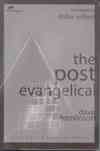 Tomlinson,
Dave.
Tomlinson,
Dave.  Tomlinson,
Dave. The
Post-Evangelical.
Tomlinson,
Dave. The
Post-Evangelical. It is not too often that you
encounter a book that is both
brilliant and a failure at the same time. Dave Tomlinson's book
presents valid
and important insights into contemporary culture, but at times it
generalizes
and misrepresents culture and history so much that one is left
wondering how
the book made it to print. I read the revised North American Edition.
It was
first published in
These statements caught my attention and ire:
"Medieval religion was simplistic and authoritarian..." (p. 71)
(Clearly Tomlinson has not read the great mediaeval theologian Thomas Aquinas. His writings and those of many other mediaeval authors contain great complexity and advocate a God that is not easily characterized as simply authoritative.)
"When the colonists won the Revolutionary War, evangelicalism--armed with the momentum and righteousness of victory--exploded onto the American frontier. Many evangelicals thought of American and Christian as being synonymous." (p. 36)
(Tomlinson groups Deists with Christians, when in fact there were some rather important differences at that time. Also the applying the term "evangelical" to that period of American history is problematic since comparisons with present day evangelicalism are difficult to make.)
In addition to statements such as these, Chapters 7 and 8 indicate that the author does not hold the Bible to be the inspired word of God in the same way that evangelicals do. In these chapters he sets up a straw man who has the "naive realism" (p. 100) to believe in the historical accuracy of the Bible. Tomlinson proceeds to provide another definition for the inspired word of God. He finds the Bible to be a symbolic revelation or metaphor (p. 114), expressing what cannot be expressed by propositions or statements of fact. Imagination is key to hearing God's. "Faith itself operates on an intuitive and imaginative level" (p. 115). The problem with Tomlinson's advocacy of intuition and imagination is that it leads to very different interpretations of Scripture. It is also difficult to see how the corrective power of the Scripture (2 Tim. 3:16) enters into Tomlinson's equation. I know of no one who intuits or dreams about discipline or self correction!
I don't know why, but all the postmodern books I have read have side bars with either anecdotes or comments from other authors. Perhaps this is a post-modern way to present material. In The Post-Evangelical the side bar comments by other authors greatly enrich the book. This is the best use of that tool that I have ever seen. In particular, statements by Mark Galli are exceptionally insightful and fortunately his comments correct many misstatements in the book. The book is thus set up as a counterpoint between Tomlinson and the many other authors who at times agree with him and at other times point out the flaws of his statements. The dialogues give brilliant observations of our present day culture and trends in post-modernism.
With the deficits mentioned above, the strength of the book is found in the manner in which it highlights many of the failings of the evangelical church: